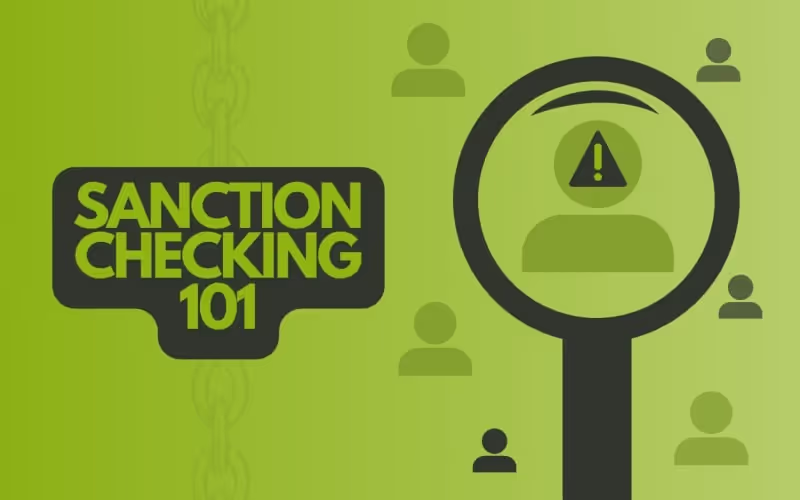
What Is a Sanction Check? An Essential Introduction for Beginners
A sanction check prevents businesses from performing transactions with sanctioned entities due to their involvement in illegal or prohibited activities. In this essential introduction for beginners, you will learn their significance, risks, best practices, and the penalties for non-compliance.
Here is a misconception: Only large businesses and organizations with global compliance teams perform sanction checks. Another inaccurate belief is that it's a process that only regulated sectors, such as banking, perform.
Today, hundreds of thousands of SMEs, start-ups, and small businesses from regulated and non-regulated industries perform sanction checks every day. Why? Because they are equally at risk of doing business with sanctioned entities and individuals.
And with various sanctioning regimes cracking down on sanctions evasion, the severe financial and reputational risks make sanction checking a worthwhile and necessary investment. Did the money question come up? Yes, it did. Another misconception of sanction checking is cost. And this is something you perhaps didn't know:
Companies can fulfill their sanctions compliance obligations for less than the cost of a cup of coffee per day.
What Is a Sanction Check?
A sanction check prevents businesses from performing transactions with sanctioned individuals and entities due to their involvement in illegal or prohibited activities.
Governments, international organizations, and regulatory bodies impose sanctions to exert pressure or address specific concerns such as terrorism and human rights violations. In layperson's terms - it's a diplomatic slap on the wrist.
The most sanctioned countries in the world today include Russia, Iran, Syria, North Korea, Belarus, Myanmar, and Venezuela. For example, many nations are uncomfortable with North Korea's nuclear weapons program. And imposing sanctions is a tactic to pressure the isolated communist country to abandon its nuclear ambitions.
When a business performs a sanctions check, they access a database (as offered by sanctions.io) that checks to see if any customers, clients, suppliers, or business partners appear on global sanctions lists. The technical name for this process within the compliance community is sanctions screening.
Our ultimate guide to sanctions screening goes into more granular detail.
You can also try sanctions.io's Free Sanctions Check (towards the bottom of the page). For example, if you type in 'Nicolas Maduro,' the sanctioned President of Venezuela appears on the US's Office of Foreign Assets Control (OFAC) Specially Designated Nationals (SDN) list.
What Are the Types of Sanctions?
Various types of sanctions exist. And it's much more complicated than first meets the eye. But the good news is that when companies perform a sanction check, a deep knowledge of the types of sanctions is not necessary. What's important is knowing if there is a match (and conducting due diligence on the individual or entity).
But it's still important to understand the most common types of sanctions to have a broader understanding of what you are checking for.
Economic Sanctions
Economic sanctions restrict economic activities with targeted countries or entities. Tangible examples include:
- Investment bans
- Technology sales restrictions
- Limitations or prohibitions on financial transactions
- Asset freezes
- Embargoes
Diplomatic Sanctions
Diplomatic sanctions use punitive diplomatic measures to pressure a targeted country or regime. The objective, like with economic sanctions, is to isolate the country, signaling disagreement with its actions or policies. Tangible examples include:
- Expulsion of diplomats
- Denial of visas
- Suspension of diplomatic communication
- Travel restrictions
The other significant type of sanction is military sanctions. And there are many more, such as cyber sanctions. Often, sanctions can be grouped into various categories simultaneously.
When you perform a sanction check, matches will come from individuals or entities subject to all the types of sanctions mentioned. Identifying and assessing these matches is crucial to ensure compliance with applicable sanctions regulations.
When Are Sanctions Checks Performed?
There are different scenarios when businesses and organizations perform a sanctions check, for example, when employees join a new company, in mergers and acquisitions, and for supplier due diligence. The most common situations, though, are the following:
Sanction Checks in the Customer Onboarding Process
Sanction checking is a vital part of the customer onboarding process, especially in regulated industries like finance and banking. This is where the related compliance processes of sanctions screening, Know-Your-Customer (KYC), and Politically Exposed Person (PEP) screening meet to battle financial crime.
And remember this: A sanctions check of a new customer (and regularly performing checks on existing customers) is not just compliance box-ticking. Nefarious actors on sanctions lists may be associated with money laundering, fraud, and the financing of terrorism - posing severe risks.
Weeding them out is not just about being compliant. It's also about protecting your business.
Sanction Checks of Transactions
Sanction checks of transactions, commonly known as transaction screening, involves reviewing and assessing transactions to ensure compliance with sanctions regulations.
At sanctions.io, many customers integrate our AI-powered API to perform transactional screenings in real-time as and when the transaction occurs (event-driven). Here are some examples:
- International Wire Transfers
- Trade Financing
- Cross-Border Payments
- Online Transactions
- Trade and Supply Chain Transactions
In our transaction screening in AML article, you can learn more about it.
Penalties for Not Complying To Sanction Checks
Penalties for failing to comply with sanctions regimes are severe. And as sanctions.io reported, in early 2023, British American Tobacco (BAT) was fined an astonishing $635M for failing to comply with sanctions on North Korea.
But it's not only the company or organization at risk of punishment. The compliance officer, the sanctions officer, or the employee responsible for compliance, who often holds another role in small companies and start-ups, may also be held personally liable for sanctions violations (you can learn how to minimize the personal liability risk as a compliance officer in our blog).
Companies must comply with different sanctions regimes depending on where they do business. It's essential to seek local advice when forming (or improving upon) a sanctions screening program.
However, here are the four significant global sanctions lists that a sanctions check should include:

Failure to perform sanctions checks against global sanctions lists can result in severe financial and reputational penalties.
Next Steps: Discover Potential Sanctions Breaches Right Now
If you would like to perform a sanctions check and discover potential breaches in your business right now, we offer a free 7-day trial (no credit card is required). You can get to know sanctions.io's service even with basic technology skills - for example, by simply uploading a .csv file with your client and business partner data.
We would also be delighted to walk you through our service and answer all your queries regarding the sanctions.io API, integrations, and more. Book a free Discovery Call now.
sanctions.io is a highly reliable and cost-effective solution for sanction checking. AI-powered and with an enterprise-grade API with 99.99% uptime are just some of the reasons why customers globally trust us with their sanctions screening needs.



